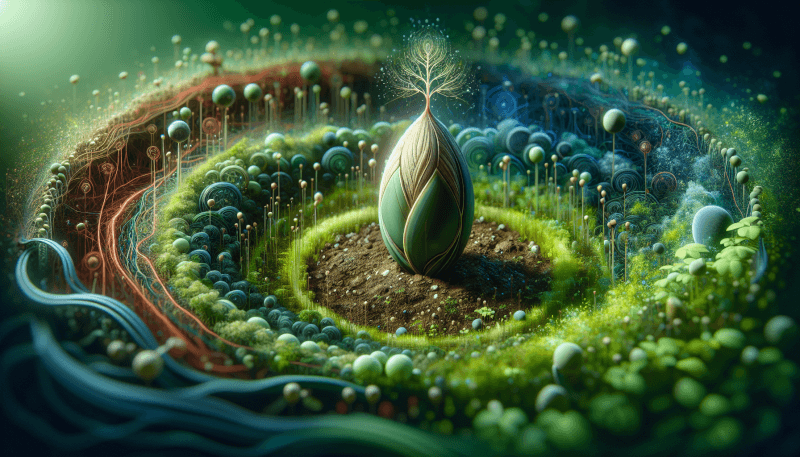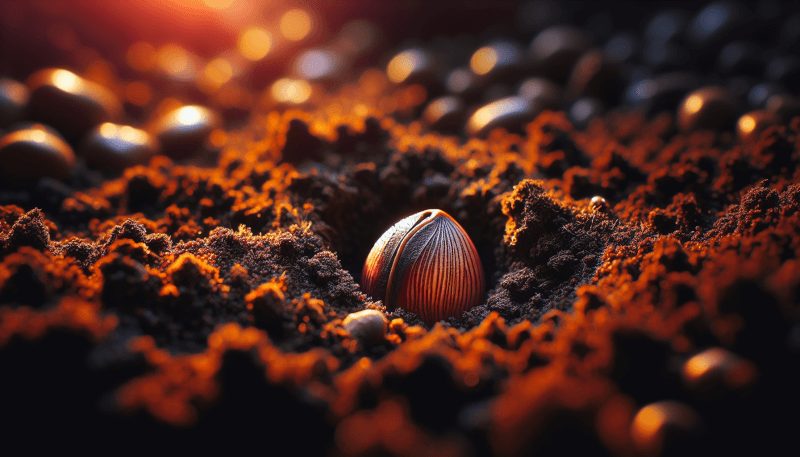👋 Click the mic button to talk to Alfred, the Todd's Seeds Gardening/Sprouting Expert – Feel free to ask him anything!
Ask Virtual Todd Anything - Click the Mic
Imagine having an abundance of fresh, homegrown produce right at your fingertips. Whether you are an avid gardener or simply enjoy the idea of growing your own food, understanding the sprouting process is essential. Have you ever wondered how long it takes for seeds to sprout? In this article, we will explore the timeline of the sprouting process and discover the factors that influence the time it takes for seeds to transform into thriving plants. So, get ready to dive into the exciting world of sprouting and learn exactly how long it takes for those tiny seeds to burst with life and vitality.

Factors Affecting Seed Germination
Seed germination is a complex process that is influenced by various factors. Understanding these factors can help you optimize the germination process and improve the success rate of growing plants from seeds. The key factors that affect seed germination include seed type, environmental conditions, seed quality, and seed treatments.
Seed Type
Different types of seeds have different germination requirements. Some seeds germinate quickly, while others take longer. Additionally, certain seeds may require special treatments to break dormancy and initiate germination. Understanding the specific requirements of the seeds you are planting is essential for successful germination.
Environmental Conditions
Environmental conditions play a crucial role in seed germination. Seeds need the right combination of temperature, moisture, and light to sprout. Each plant species has its own ideal conditions, and it is important to provide them to ensure successful germination. Factors such as temperature extremes, lack of water, and exposure to light can all affect the germination process.
Seed Quality
The quality of the seeds you use also affects germination. High-quality seeds have a greater chance of germinating successfully compared to low-quality seeds. Investing in good quality seeds from reputable sources ensures that you have a higher chance of achieving successful germination.
Seed Treatments
Some seeds require special treatments to improve germination rates. These treatments can include scarification, stratification, or soaking in water. Scarification involves scratching or nicking the seed coat to allow water absorption, while stratification is a cold treatment that simulates winter conditions. Seed treatments can help overcome dormancy and improve germination rates.
Seed Germination Process
Understanding the stages of seed germination can help you better comprehend the process and identify any issues that may arise. The seed germination process consists of several distinct stages: imbibition, activation of enzymes, respiration and growth, and emergence of the radicle.
Imbibition
Imbibition is the initial stage of seed germination, where the seed absorbs water. Water acts as a trigger, signaling the seed to start the germination process. It causes the seed to swell and the protective seed coat to soften.
Activation of Enzymes
Once the seed has absorbed enough water, it activates enzymes that catalyze biochemical reactions necessary for germination. These enzymes break down complex nutrients stored in the seed, converting them into simpler components that the embryo can utilize for growth.
Respiration and Growth
Respiration and growth occur as the embryo starts to utilize the simpler nutrients produced by enzyme activity. During respiration, the stored nutrients are converted into energy for the growing embryo. As the embryo expands, the shoot and root systems develop.
Emergence of the Radicle
The radicle, the embryonic root, emerges first from the seed. It anchors the seedling into the soil and absorbs water and nutrients to support further growth. After the radicle emerges, the seedling continues to grow, developing leaves and stems.

Common Seed Germination Times
The time required for seeds to sprout varies depending on the type of seeds. While some seeds germinate quickly within a few days, others can take weeks or even months. Here is a breakdown of the average germination times for different categories of seeds:
Vegetable Seeds
Vegetable seeds, such as tomatoes, carrots, lettuce, and peppers, generally have relatively short germination times. Tomato seeds, for example, usually take around 5 to 10 days to sprout. Carrot seeds can take a bit longer, averaging around 14 to 21 days. Lettuce seeds typically germinate within 7 to 14 days, while pepper seeds may take up to 21 days.
Herb Seeds
Herb seeds, including basil, cilantro, dill, and mint, also vary in germination times. Basil seeds are known to sprout quickly, usually within 5 to 10 days. Cilantro seeds can take slightly longer, ranging from 7 to 14 days. Dill seeds typically germinate within 7 to 10 days, while mint seeds may take around 10 to 15 days.
Flower Seeds
Flower seeds, like sunflowers, marigolds, petunias, and zinnias, have diverse germination periods. Sunflower seeds, known for their rapid growth, generally sprout within 7 to 10 days. Marigold seeds typically germinate in about 5 to 7 days. Petunia seeds may take around 10 to 14 days, while zinnia seeds can vary between 7 to 14 days.
Tree Seeds
Germination times for tree seeds, such as maple, oak, pine, and apple, tend to be longer compared to other seed types. Maple seeds, for instance, can take anywhere from 10 days to several weeks to sprout. Oak seeds usually require a long stratification period and may take several months. Pine seeds also have varying germination periods, ranging from several weeks to a few months. Apple seeds can take around 2 to 3 weeks to germinate.
Factors That Can Delay Seed Germination
While seeds generally strive to germinate under optimal conditions, certain factors can delay or hinder the process. Being aware of these factors can help you identify any potential issues and take appropriate measures to improve germination rates.
Temperature Extremes
Seeds are sensitive to temperatures, and extremes can inhibit germination. Both excessively high and low temperatures can slow down or prevent germination altogether. It is important to check the recommended temperature range for the seeds you are planting to ensure your germination environment is suitable.
Lack of Water
Seeds need adequate moisture to germinate, and a lack of water can significantly delay or prevent germination. If the soil or planting medium becomes too dry, the seeds may not receive the necessary moisture needed to initiate germination. Proper watering practices are crucial to ensure consistent moisture levels.
Poor Seed Quality
Using low-quality or old seeds can also impede germination. These seeds may have a lower viability and may not have the capacity to germinate successfully. It is essential to source fresh, high-quality seeds from reliable suppliers to improve germination rates.
Tips to Improve Seed Germination
While there are factors that can hinder seed germination, there are also several practices you can implement to improve germination rates. Consider the following tips to enhance your seed germination success:
Pre-soaking Seeds
Some seeds can benefit from soaking in water before planting. This helps soften the seed coat and allows water to penetrate more easily. Soaking times can vary depending on the seed type, so it is important to research specific soaking requirements for the seeds you are planting.
Providing Optimal Temperature
Maintaining the right temperature range is crucial for optimal germination. Consult the seed packet or do some research to determine the ideal temperature requirements for the specific seeds you are planting. Using a seed starting heat mat or placing the seeds in a warm location can help create favorable conditions and speed up germination.
Proper Watering
Consistent and appropriate watering is essential for successful seed germination. Providing enough moisture without overwatering is crucial. Ensure the soil or planting medium remains consistently moist but not waterlogged. Using a misting spray bottle or a fine watering can is ideal for seedlings to prevent disturbance.
Using Seedling Trays or Greenhouses
Using seedling trays or greenhouses can help create a controlled environment ideal for germination. These setups provide protection from temperature fluctuations, excessive wind, and pests. They also help maintain consistent moisture levels and facilitate easier monitoring of seedling growth.
Conclusion
Seed germination is a fascinating process influenced by various factors. Understanding the specific requirements and germination times for different seed types can greatly improve your gardening experience. By considering factors such as seed type, environmental conditions, seed quality, and using appropriate seed treatments, you can increase the likelihood of successful seed germination. Remember to provide optimal conditions, be patient, and take the necessary steps to ensure your seeds have the best chance to sprout and grow into flourishing plants. Happy gardening!


